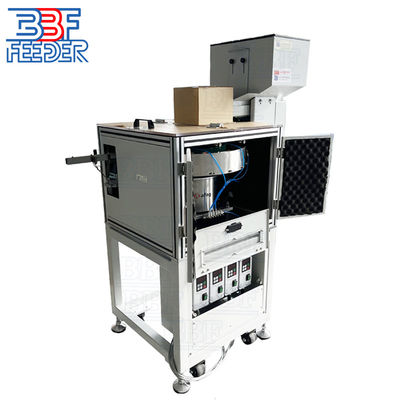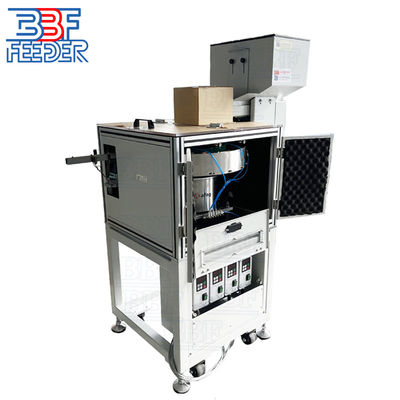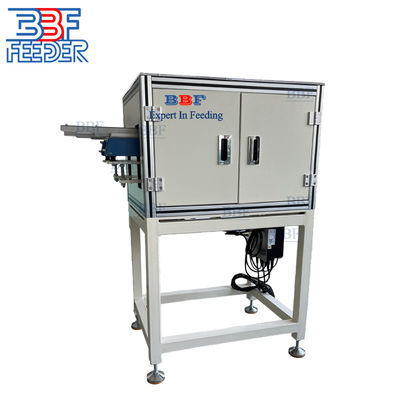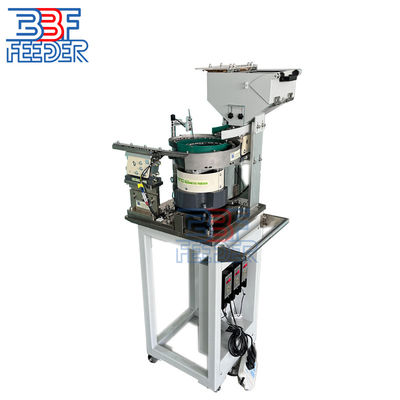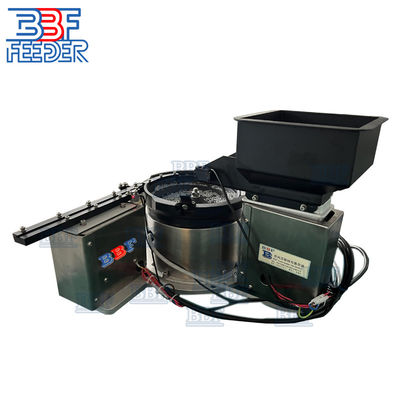Automatic Vibration Bowl Feeder Soundproof Parts Vibratory Bowl Feeder Screws
1 . Descriptions:
Automation is increasingly adopted by manufacturers to enhance productivity and efficiency in order to remain competitive. An integral component of automated assembly lines is the parts feeding system. These systems have undergone significant evolution over time and continue to advance alongside technology.
Basic parts feeding systems primarily serve the purpose of sorting and orienting pieces for subsequent processing in machines. However, more advanced systems have the capability to handle multiple pieces simultaneously and may even employ robotic arms or other machinery to precisely position the pieces.
Manufacturers currently face the significant challenge of meeting the demand for new products. To address this challenge, they need the ability to rapidly prototype new products and quickly reconfigure their production lines to accommodate new models. Flexible parts feeding systems play a crucial role in this process, as they can be easily reconfigured to handle different types and sizes of pieces.
Another notable trend impacting parts feeding systems is the trend towards miniaturization. As electronics and other components continue to shrink in size, the pieces that need to be fed into assembly machines also become smaller. This poses a challenge for parts feeding systems, as they must accurately handle these very small pieces without causing any damage.
Determining the optimal approach for feeding parts from bulk into an automated machine depends on several factors, including the type and characteristics of the parts, the production volume, the level of automation, and the specific requirements of the automated machine.
2 . Specifications:
| Product name |
Vibratory Bowl Feeder |
| Material |
Aluminum(AL7075), Stainless Steel(SUS304) or Based on Customers' Requirements |
| Controller |
CUH,Sanki,Sinfonia,REO,Afag |
| Voltage |
220V 50HZ/110V 60Hz or Based on Customers' Requirements |
| Power |
300W/500W/1000W/1500W/2000W |
|
After-sales Service
|
Spare Parts and Technology Support |
| Speed |
Based on Customers Requirements |
| Warranty |
2 Years |
| Certification |
CE, ISO9001, ROHS |
| Lead Time |
3 Working Weeks |
3 . Vibratory Bowl Feeders and Their Applications:
Vibratory bowl feeders are highly versatile and widely used for feeding small to medium-sized parts. These feeders utilize vibrations to orient and feed parts from a bulk supply. They are commonly employed in various industries for automated assembly, packaging and sorting, pharmaceutical and medical devices, electronics manufacturing, food and beverage processing, automotive manufacturing, aerospace, consumer goods, hardware and fasteners, bearing and bushing assembly, as well as customized parts feeding.
Automated Assembly: Vibratory bowl feeders deliver components such as screws, nuts, bolts, washers, and connectors to the assembly line, ensuring a consistent supply of parts in the correct orientation for assembly robots or operators.
Packaging and Sorting: Vibratory bowl feeders align and feed items like caps, lids, small containers, and consumer products for packaging lines, maintaining a steady product flow and proper orientation.
Pharmaceutical and Medical Devices: Vibratory bowl feeders feed and orient small components such as pills, capsules, vials, and medical instruments for packaging or assembly processes in the pharmaceutical and medical device industries.
Electronics Manufacturing: Vibratory bowl feeders play a critical role in the electronics industry by feeding electronic components like resistors, capacitors, diodes, and connectors, ensuring precise placement and orientation on circuit boards.
Food and Beverage: Vibratory bowl feeders handle products such as candies, nuts, screws, and small food items in food processing and packaging, maintaining hygiene standards and consistent product presentation.
Automotive Manufacturing: Vibratory bowl feeders supply various small parts like screws, clips, fasteners, and connectors to automotive assembly lines.
Aerospace: Vibratory bowl feeders handle and orient components like rivets, bolts, washers, and other fasteners in aerospace manufacturing.
Consumer Goods: Vibratory bowl feeders assist in feeding and orienting parts or components in the production of consumer goods such as toys, personal care products, and small appliances.
Hardware and Fasteners: Vibratory bowl feeders sort and supply screws, nuts, bolts, washers, and other fasteners in bulk for hardware manufacturing.
Bearing and Bushing Assembly: Vibratory bowl feeders align and feed ball bearings, roller bearings, and bushings in bearing and bushing manufacturing for assembly operations.
Customized Parts Feeding: Vibratory bowl feeders can be customized to handle specific parts or components in unique manufacturing processes where other feeding methods may not be as efficient.
Part Escapements are mechanical devices that control the release of individual parts or components from a bulk supply. They ensure that parts are presented in a controlled and sequential manner to downstream processes or assembly stations, preventing jams, collisions, and misalignment. Part escapements are commonly used in combination with other feeding methods, such as being placed at the end of a linear track as parts exit a vibratory bowl feeder.
4 . More Pictures:



 Your message must be between 20-3,000 characters!
Your message must be between 20-3,000 characters! Please check your E-mail!
Please check your E-mail!  Your message must be between 20-3,000 characters!
Your message must be between 20-3,000 characters! Please check your E-mail!
Please check your E-mail! 


